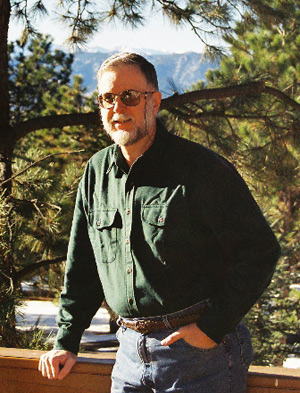University Relations
Communique
The online newsletter for UCCS faculty and staff. Brought to you by the UCCS Office of University Relations.
You can view the CURRENT ISSUE, browse the ARCHIVES, send us an EMAIL, and even SUBMIT a story.
Volume 58, Issue 1
July, 2009
Faculty reminisces as nation marks 40th anniversary of lunar landing
David Schmidt admits to wearing horn-rimmed spectacles and looking a lot like the men depicted as 1960s NASA workers in the film “Apollo 13.”
“But I promise, I didn’t have a pocket protector,” Schmidt, professor emeritus of mechanical and aerospace engineering, said recently. “And my slide rule was hidden in my briefcase.”
Schmidt played a part in the national achievement of landing a man on the moon 40 years ago. As a recent engineering undergraduate, he worked with a McDonald-Douglas team of engineers who designed, tested, and built the third rocket stage that propelled the lunar model and the crew of Apollo 11 to the moon in July 1969. The first two rocket stages lifted Apollo 11 into low- Earth orbit while a third stage sent it on a slingshot trajectory to the moon.
“I remember President Kennedy saying ‘we choose to go to the moon in this decade and do the other things, not because they are easy, but because they are hard.’’’ Schmidt said. “There was a sense of enthusiasm in the country, of looking outward, asking the question of ‘what’s out there?’ and following it with ‘let’s find out.’ ”
“It was a great time to be a young engineer.”
Schmidt marvels at the accomplishments of the myriad of NASA subcontractors – he estimated 50 to 75 companies and thousands of engineers -- who came together to put a man on the moon. Reaching the moon was a national goal, one that unified Americans in the 1960s, a decade rocked by assassinations, the Vietnam War, and motivated by competition with the Soviet Union which launched its Sputnik spacecraft in 1957.
“Some people called landing on the moon a monumental achievement of science,” Schmidt said. “But it wasn’t. We already knew the science – the physics. It was an engineering achievement because we had to build a machine to safely take us there and get us back.”
Schmidt, who by July 1969 had returned to graduate school, remembers standing in the Student Union at Purdue University and watching Neil Armstrong take his first steps on the moon.
“It was a big deal for the country. I think everyone felt as if they had ownership of the accomplishment. But at Purdue, since Armstrong was a graduate, it was a really big deal. We somehow felt more connected to him and the achievement.”
That Apollo 11 was created with technology that is primitive by today’s standards serves testament to the ingenuity of those involved, Schmidt said.
“Your cell phone has a lot more computing power than what was on Apollo,” Schmidt said. “But, remember, in those days computers were huge mainframe devices. To have a computer on board at all was a new idea. You could say the space program led us to the PC and the entire effort to miniaturize electronics.”
Though retired, the gray-bearded Schmidt remains active at UCCS by writing the occasional research grant and advising Ph.D. students. It leaves time, he says, for mountain treks on a new 1,300 cc Honda motorcycle, and thinking about the accomplishments of the past 40 years.

Communique is the online newsletter for UCCS faculty and staff. It is published weekly during the fall and spring semesters, monthly during the summer semester. Communique is sent to faculty and staff e-mail lists and, by request, to other e-mail addresses. Previous issues are available in the Communique Archives at www.uccs.edu/ur/communique/archives.html, and the current issue is always at www.uccs.edu/ur/communique. Suggestions and comments are welcome. Send ideas to ur@uccs.edu or call Tom Hutton, 255-3439.
View Current Communique
